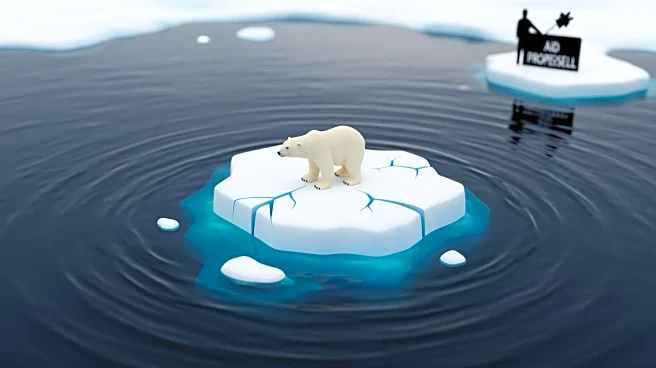What's Happening?
The Trump administration is considering a $50 million foreign aid package to protect polar bears in Greenland, a move that has puzzled conservation researchers in the country. This proposal comes at a time
when U.S. polar bears are facing significant threats due to oil industry operations in Alaska's Arctic, driven by President Trump's fossil fuel agenda. Companies are preparing to enter polar bear habitats with heavy industrial equipment, which poses a risk to bear cubs in their dens. Seismic testing, used to locate underground oil reserves, involves 90,000-pound vehicles that create noise and pollution across large areas. Previous seismic exploration plans in the Arctic National Wildlife Refuge have already impacted the Southern Beaufort Sea polar bear population, which has seen a 40% decline.
Why It's Important?
The potential impact of oil industry operations on polar bear populations in Alaska highlights the environmental consequences of the Trump administration's energy policies. While the proposed aid for Greenland's polar bears is significant, it raises questions about prioritizing foreign conservation efforts over domestic ones. The threat to U.S. polar bears could lead to further declines in their population, affecting biodiversity and the ecological balance in the Arctic region. This situation underscores the need for a balanced approach to energy development that considers environmental preservation and the protection of endangered species.
What's Next?
If the Trump administration proceeds with the aid package for Greenland, it may face criticism for neglecting domestic conservation needs. Environmental groups and policymakers could push for more stringent regulations to protect U.S. polar bears from industrial activities. The ongoing debate over energy policies and wildlife conservation is likely to continue, with potential legal challenges and public advocacy efforts aimed at safeguarding polar bear habitats in Alaska.
Beyond the Headlines
The ethical implications of prioritizing foreign conservation efforts over domestic ones raise questions about the administration's commitment to environmental stewardship. The long-term effects of industrial activities on polar bear populations could lead to irreversible ecological damage, prompting discussions on sustainable energy practices and wildlife protection. This situation may also influence future policy decisions regarding the balance between economic development and environmental conservation.









